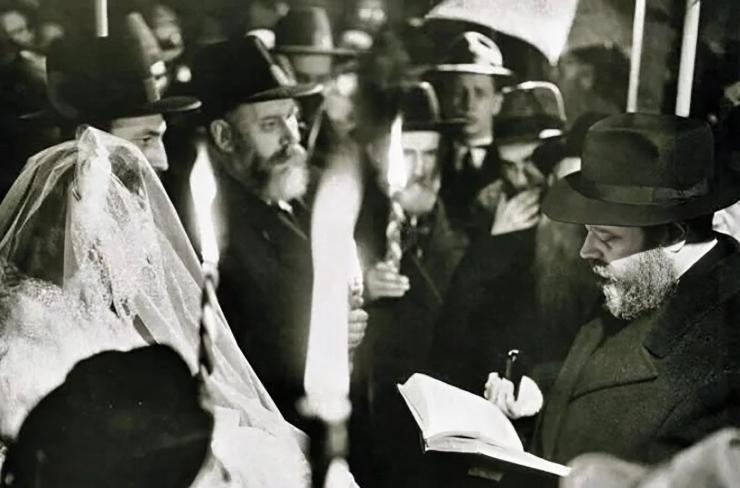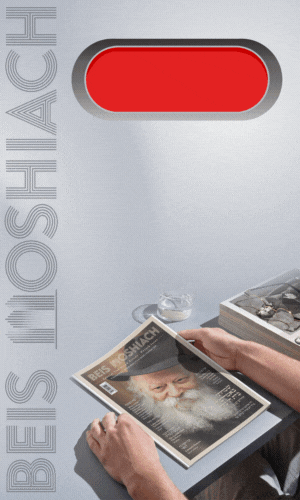Harav Dovid Schochet A”H: A Firm & Compassionate Rav
Beis Moshiach Magazine presents a profile of Harav Dovid Schochet A”H, Toronto’s longtime Rav, who served as President of the Toronto Rabbinical Council and a member of Vaad Rabbonei Lubavitch • Presented in honor of Harav Schochet’s Shloshim on 19 Adar • Full Article
By Shneur Zalman Levin, Beis Moshiach Magazine
Harav Dovid Schochet was born in Basel, Switzerland in 5692. In 5707, when he was fifteen, the family moved to Holland where his father, Rabbi Dov Yehuda Schochet, was appointed the chief rabbi of the Hague. He opened a yeshiva for Jewish refugees who came from Hungary following World War II.
When there were no suitable schools for his sons, his father decided to emigrate to Toronto where he could provide his children with a proper Jewish education. The family emigrated in 5711. A short while later, his father took a rabbinic position from which he developed ties with religious communities in the city, including Chabad.
The Schochet family were not Chabad Chassidim but over time, a warm relationship developed between the Rav’s family and the community of Chassidim.
“At that time, we heard of the coronation of the new Rebbe of Chabad,” said R’ Dovid Schochet in a JEM interview.
After completing his studies, he went to learn in yeshivas Tomchei Tmimim in 770.
“I chose a Chabad yeshiva with the encouragement of my uncle, Rabbi Chodakov, who was the Rebbe’s secretary. However, what really convinced me to choose to learn in this yeshiva was the Jewish pride that I saw Chabad Chassidim displaying. Many observant Jews tried to blend into the environment, although you couldn’t blame them considering the open anti-semitism that was prevalent then. In contrast, the Lubavitchers wore their yarmulkas openly and without fear, and even walked around in the streets with their tzitzis strings sticking out. That impressed me a lot.”
AMAZING MIRACLE FROM THE NEW REBBE
In those early days of the Rebbe’s nesius, the Schochet family experienced a tremendous miracle of the Rebbe, which connected them all the more as Chassidim of the Rebbe. In Harav Schochet’s words:
One morning, a terrible tragedy occurred in our home. My mother put up a pot of water to boil for household use. When it boiled, she took it off the fire and put it on the floor. My little sister, one and a half years old, crawled over, climbed on it and fell into the boiling water.
Her terrible screaming brought the family running. Her entire body was red and soon her skin began to peel off, her condition worsening from moment to moment. We hurriedly brought her to the biggest hospital in the city, as her condition became progressively worse from minute to minute. After the initial diagnosis, the conclusions of the doctors was extremely bleak. They said that there was almost no chance to save her life, but they would try their best. She was bandaged from head to toe and put into an isolation ward in order to avoid infection.



The Rebbe being mesader kiddushin at Harav Dovid Schochet’s wedding
My father, who had already heard about the Lubavitcher Rebbe, decided to ask for his blessing. To his great surprise, when he called the Rebbe’s secreteriat and stated his name and the details of what happened, he heard the Rebbe himself come on the line and speak to him. My father explained to the Rebbe the severity of the situation and asked that he arouse divine mercies upon his daughter. The Rebbe listened intently and, without responding about the situation, asked about how my father was doing and his adjustment to his new place of residence. My father answered briefly since he was entirely focused on the fate of the little girl. At the end of the conversation, the Rebbe blessed the little girl with a refuah shleima and the call ended.
My father felt somewhat disappointed. It seemed to him that the Rebbe had not related to the situation of the child with the sense of fatefulness that he felt; almost making light of the matter. Regardless, he strengthened himself with the faith that the Rebbe’s bracha would be fulfilled and the child would recover.
The next day, a message arrived in our home from the Rebbe’s secretary that the Rebbe had instructed that a kiddush be made in the home of the girl’s parents. She was still in a critical state according to the doctors, and according to reason we were very far from the celebratory stage. However, my father believed with full faith in the words of the Rebbe, and decided to carry them out without question. And so, a celebratory kiddush was held in our home where my gave thanks and praise to Hashem for the recovery of his daughter, as if she were no longer in danger of losing her life…
Days passed, and she remained hospitalized in the isolation room. Since none of us were allowed into her room, there was no reason to remain in the hospital, so were all home and would call on the phone from time to time for updates on her condition.
One day, the phone rang in our home. The doctors asked my parents to come immediately to the hospital. When they arrived, shocked to the depths of their souls, they were told that the little girl’s hours were numbered. Only my father was allowed into her room, and he barely recognized his daughter. Her entire body was white, her face swollen, and she was breathing with difficulty.
Without losing his wits, my father once again called the Rebbe. Again, the Rebbe was on the line and when my father explained the situation, the Rebbe answered forcefully, “Nonsense! The child is healthy and will continue to be healthy!” The Rebbe instructed my father to approach the doctors and to raise a hue and cry about their improper treatment…
My father, who was shocked by the first half of the Rebbe’s answer, didn’t know how to digest the second half. The Rebbe sensed his hesitancy and repeated his words, “Approach the doctors immediately and tell them that they are at fault for the situation that has arisen!” My father followed the Rebbe’s instructions; he returned to the doctors and began to make a scene.
Apparently, they were stunned by his screams and they decided to check the treatment protocol and to their shock they discovered that she was given the wrong infusion! The intravenous solution was quickly changed and it didn’t take long before she recovered. New skin grew in, and she is fine ever since, boruch Hashem.
After about two years, my father went to the Rebbe for the first time and had yechidus. This was on Yud Shevat 5713. My father thanked the Rebbe again and again for the bracha that led to the refuah. The Rebbe suggested that my father go to the tziyun of the Rebbe Rayatz to give thanks there for his daughter’s recovery.
“Years passed,” said R’ Schochet, “and my sister grew up and also went to the Rebbe for yechidus. The Rebbe gave her a a five-ruble coin and said it was from the fund of the Rebbe Rayatz nishmaso eden.”
BEING GRATEFUL FOR THE LITTLE THINGS
A while after R’ Schochet was registered in the yeshiva, he had his first yechidus with the Rebbe.
“What I remember clearly from the first yechidus is the message about how much one needs to appreciate and value life. ‘Don’t regard life as a given,’ said the Rebbe. ‘In the morning, when you wake up, give thanks to Hashem for everything He gave you.’
“The Rebbe went on to say that many people go to sleep at night and expect their shoes to be by their bed where they left them the night before when they wake up in the morning. As they get dressed, they complain that the weather is too cold or hot. ‘In effect, they are criticizing G-d,’ the Rebbe said, ‘because who makes the weather? Instead, they should be grateful that they are still alive, that their possessions are still with them, that a new day is beginning where they have an opportunity to do many good deeds.’
The Rebbe also advised him to go into Jewish education in that first audience. He recalled, “I had been planning to enroll in university after finishing my yeshiva studies, with the intent of becoming an electrical engineer, but the Rebbe said that I would find working in Jewish outreach much more rewarding because, as he put it, every Jew is a diamond.”
Very quickly he saw the need to start documenting the Rebbe’s sichos using technology, which wasn’t being done at the time. In the diaries of the time, it says that at the sicha of the third night of Chanuka 5714, during the kabbolas panim at the wedding of R’ Benzion Binyamin Altheus, Dovid Schochet put on a tape recorder when the Rebbe spoke. This was the first time a farbrengen of the Rebbe was recorded.
After that, he would always bring a tape recorder with him and record the Rebbe’s sichos, which preserved numerous sichos, which were later written up very exactly, for all future generations.
On occasion, he had the privilege of sending the recordings to the inner sanctum, which the Rebbe listened to and would sometimes add comments and explanations or edits, which expanded on what was said during the farbrengen.
In 5716, he was sent with a group of bachurim to Eretz Yisrael. This was after the massacre in Kfar Chabad, when the Rebbe wanted to encourage Chabad Chassidim in Eretz Yisrael, especially in Kfar Chabad. In diaries that describe the trip he is described as, “HaTamim Dovid Schochet has been learning for four years already in the Lubavitch yeshiva in Brooklyn. He received semicha and is a very gifted young man with a scholar’s forehead and a blond beard. He is also armed with six languages which serve him wherever he goes.”
For nearly a month, he and his friends visited all over Eretz Yisrael and he spoke and encouraged the early settlers. As is documented in diaries of those days, he addressed a wide range of audiences, reviewing sichos of the Rebbe and farbrenging in a number of places, bringing with him the special flavor of Beis Chayeinu.



Rabbi Efraim Wolf welcoming the bachur shliach, Harav Dovid Schochet
THE REBBE WAS HIS MESADER KIDDUSHIN
R’ Schochet married Batsheva Sudak on 3 Nissan 5717. The chuppa was held in the yard of 770 and the Rebbe was the mesader kiddushin. Not only that, but the Rebbe farbrenged on his Shabbos aufruf and the Shabbos after the wedding, the Shabbos sheva brachos. It was after his father approached the Rebbe after davening and asked that he farbreng with the Chassidim in honor of the Shabbos sheva brachos. The Rebbe expressed surprise and said, “It’s not Shabbos Mevorchim,” but his father didn’t relent and responded cleverly, “Now is the time when the Nesiim are giving” (referring to the dedication of the Mishkan during the first twelve days of Nissan), and the Rebbe agreed to farbreng.
The first words of the farbrengen had to do with the Schochet family simcha. As described in the diaries, “The statement of Chazal was explained at length, ‘Whoever partakes of meal of a chassan and makes him rejoice, merits Torah which was given with five ‘kolos’ corresponding to the five kolos, ‘kol sasson v’kol simcha, kol chassan v’kol kallah, kol omrim etc.’” (The sicha was later printed in Likutei Sichos).
Even before he married, R’ Schochet was hired as member of the educational staff in the Chabad mosdos in Toronto and he rented a house nearby. Shortly after the wedding, he and his wife went to Toronto where he began working in the mosad. Not long after, he received a warm letter of blessing from the Rebbe, which noted his move to Toronto shortly after he married, “In response to your informing me that you rented an apartment near the mosad where you do holy work to educate Jewish children al taharas ha’kodesh through Torah study permeated with yiras shomayim and guidance in the fulfillment of its mitzvos – And merit accrues to days days of merit, the days of their building a Jewish home, the days of their marriage in a good and successful time. Such that He who formed man should establish their building as an eternal edifice, based on Torah and mitzvos permeated with the light and vitality of Chassidus.”
“With blessings for mazal tov, mazal tov.”
COMPASSIONATE FATHER TO HIS KEHILLA
R’ Schochet was appointed rav of the Chabad community in Toronto which he led with a firm hand and a compassionate heart. His impact in Torah and halacha extended to the larger community outside of Chabad when he was appointed to head the local Agudas HaRabbanim.
Rabbi Mordechai Wechter was one of his mekuravim. “Harav Schochet was a Jew whose whole life was Torah study. He was surrounded by sefarim and learned from morning to night. This was the essence of his life.
“I went to visit him a few weeks ago. He was very weak but his mind was fully clear. It bothered him tremendously that he couldn’t learn. What bothered him the most was the waste of time caused by his being unable to open a sefer. I made sure he would have a tablet with shiurim; at least, he could listen.
“He was like a compassionate father to the members of his flock. If I didn’t call him one week, he would call me and ask how I am. He would always ask what’s new, what’s going on, express interest in various projects I had done, ask questions, always wanting to help and offering effective advice and ideas.
“During my last visit, he asked me various questions and I was stunned by how he remembered and cared for everyone despite his great weakness.
“Once, after a conversation about askanus in the community, he wanted to speak to me alone in a side room. He told me about a couple who came to him with serious shalom bayis problems. He felt there was no way to bridge the gap between them and he warned them, even pleaded with them, to divorce honorably without mutual recriminations. He did all he could so the process would be carried out in a respectful manner. He asked me to help them financially so they could settle into their new lives. He did this even though he didn’t owe them anything and yet, he was extremely concerned for them… That’s the way he was, a firm leader, while being a compassionate father to his kehilla.”



TO SAVE ONE JEWISH SOUL
After I was already well established in Toronto, I was invited by Rabbi Mottel Zajac, the Rebbe’s emissary to Buffalo, to give a talk to local university students. It turned out though that the audience would be mostly non-Jewish and that representatives of other religions would be speaking as well, so my first inclination was to refuse; I did not want to take the time away from my other duties in Jewish outreach. However, I did call the Rebbe’s office to ask what I should do.
The answer that I received was that it is worthwhile to influence non-Jews positively, especially regarding the mitzva of giving charity. I was also advised to recount a story attributed by some to the famous 17th century Polish rabbi, Yom Tov Lipmann (from whom I am descended, though I didn’t know it at the time).
So I did this. I attended the gathering and told the story which happened in Krakow in the days of Rabbi Yom Tov, who is also known as Tosfos Yom Tov after the title of his most famous work.
This story concerned the town scrooge called Yossele the Miser. He was a Jew, but because he flatly refused to give charity, the Jews in Krakow hated him. So much so that, when he passed away, they buried him on the very edge of the cemetery in a place set aside for unworthy people. They felt he didn’t deserve any better.
But, a couple of weeks after his funeral, a tumult was unleashed in the town. Poor people who had depended on handouts from the butcher and the baker were suddenly being turned away. As well, the funds for free loans, for help with wedding costs, for medical emergencies, had somehow mysteriously dried up.
Distraught, the people of the community came knocking on Rabbi Yom Tov’s door demanding an explanation. When he investigated, he learned that the benefactor behind all the charity in the town had been none other than Yossele. He had reimbursed the butcher and the baker for their handouts; he had kept the free-loan fund afloat. He just didn’t want anybody to know.
Rabbi Yom Tov was so moved by this man’s selfless actions and humility that he announced that, when he himself passed away, he should be buried on the edge of the cemetery next to Yossele.
When I finished telling this story, which was well received, a young priest came over to me and asked me to repeat it. At first I declined, saying jokingly, “I did my best; my English won’t be any better next time.” But he was so insistent that I agreed and invited him to my hotel room where I related the story for a second time.
I noticed that when I was speaking, he seemed very agitated. He kept pacing the floor, and when I finished, he asked me to tell the story for a third time. Thinking that he must be mentally unhinged, I demanded to know why he had this obsession with this story.
He said, “I think that Yossele was my great-grandfather.”
“How could that be?” I asked. “He was a Jew and you are a priest!”
He explained that his mother was a Polish refugee from the war, and when she married his father, who was an officer in the army, she had to agree to keep her true identity a secret. But, before she died, she confessed it all to her son. She revealed her background of Jewish ancestry, and she told him a very similar story about one of his forbears.
“That means you are a Jew,” I said. “And if you are Jew, you are obligated to follow the Torah and keep its commandments.”
He said nothing and left, and I thought that I would never hear from him again. But I did.
Years later, when I was visiting Jerusalem, a bearded man approached me near the Western Wall. “Rabbi Schochet, Shalom Aleichem,” he said.
“Do I know you?” I asked.
“You know my old self. I’m the guy that spoke with you in Buffalo… After our conversation, I did a lot of thinking, and I decided to return to my roots. And here I am now a Breslover Chassid.”
When I heard that, I realized why the Rebbe told me to give that speech and tell that story. It was no coincidence. I needed to speak before that non-Jewish audience in Buffalo, because there was one Jew there that had to be saved.
So to all Chabad emissaries I say – don’t complain that the Rebbe sent you out into the world where life is difficult. Don’t think, “I should not be here,” or “I don’t want to this or that.” Remember what it is all about – if you save one person, you save the world.
***
Rabbi Shochet passed away on 19 Shevat at the age of 91. He is survived by his wife and children, grandchildren and great-grandchildren.
*
Beis Moshiach magazine can be obtained in stores around Crown Heights. To purchase a subscription, please go to: bmoshiach.org
382
Join ChabadInfo's News Roundup and alerts for the HOTTEST Chabad news and updates!












































My father was never in yeshiva in Montreal. Please correct this misinformation and fact check with my family.
Batya Schochet Lisker